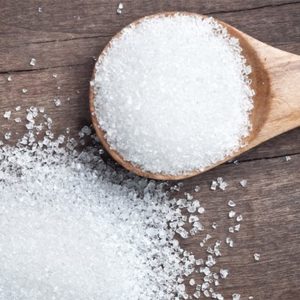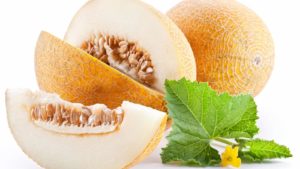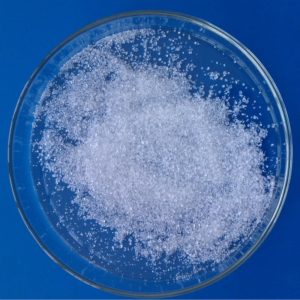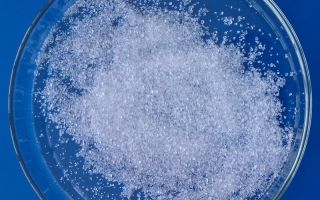Content
Sugar, in large quantities, is harmful to health and shape. Realizing this fact, more and more people are looking for options to replace it. One of the sugar substitutes is erythritol. The product has certain advantages and disadvantages in comparison with analog substances, we will try to understand this issue.
Erythritol (erythritol) is a polyhydric alcohol that successfully replaces sugar in food. In its native form, it is a white powder, odorless, sweet in taste. In all countries, it is marked with the E968 code. Polyhydric alcohol is produced by fermentation of glucose. It has practically zero calories and does not accumulate in the body. The benefits and harms of erythritol have been studied by scientists around the world to the present day.
Sugar alcohols are found in toothpastes, chewable medicines, and potions. In the food industry, erythritol polyol is used both in pure form and with the addition of other ingredients. If the concentration of erythritol is high, then during its use there is a chill on the tongue.

Sweetener production methods
Erythritol is produced from natural raw materials. For this, starchy vegetables and fruits are used. The most popular of these are tapioca and corn. Yeast can also be used for production.
Erythritol is found in plums, melons, pears and other fruits, often referred to as "melon sweetener".

Energy value of erythritol
100 grams of erythritol granules contains 0.1-0.2 kcal. According to European standards, the substance is calorie-free.
The benefits of erythritol
Erythritol, due to its qualities, has established itself as a useful product. In moderate doses, this is a real find for diabetics and those who want to lose weight. The sweetener erythritol does not harm health, but, on the contrary, benefits and normalizes the functioning of some organs.
Does not affect insulin and glucose levels
The glycemic index of erythritol is zero. The blood glucose indicator, after consuming the substance, will remain unchanged. In moderate doses, erythritol is harmless in diabetes.
Does not increase triglyceride and cholesterol levels
Synthetic sugar substitutes trigger the production of insulin in the pancreas. Erythritol differs from its counterparts in this respect. The insulin index of the sweetener is 2 units. This is 5-6 times less than that of sorbitol and xylitol. A person who uses erythritol in moderation need not worry about high blood cholesterol levels.
Doesn't spoil your teeth
Erythritol is not a breeding ground for bacteria in the oral cavity and does not affect the development of caries. Regular sugar, getting on the teeth, is a favorable environment for the development of this disease. Erythritol is not absorbed by harmful bacteriological flora.
Scientists explain the absence of harm to teeth from the use of erythritol in the acidity level. After this sweetness, the pH level remains normal for a long time. In an acidic environment, after eating sugar, teeth are subject to decay. It is not for nothing that erythritol is increasingly being used for the production of oral hygiene products.
Does not disrupt the digestive tract
In moderate doses, the sweetener does not harm the gastrointestinal tract. May cause mild laxative effects or bloating in overdose. Many sweeteners enter the large intestine and disrupt its function. This leads to improper metabolism and weight gain. Most, and this is 90%, of erythritol is absorbed in the small intestine and enters the bloodstream. Only 10% goes to the large intestine. Small doses are not able to harm the microflora. Residues of erythritol are excreted naturally.
Benefits of erythritol over other sweeteners
The benefits of the compound in comparison with other sweeteners are obvious due to the following properties:
- does not raise blood sugar, while other sugar alcohols have a significant glycemic index. For example, sorbitol - 9; xylitol - 13; glucose - 100; sucrose - 63. Erythritol is not harmful for diabetics, unlike other sugar substitutes;
- the caloric content of the compound is lower than that of other sugar alcohols. Xylitol has an indicator of 2.4 kcal / g, erythritol - 0.2 kcal / g. In European countries, this calorie content is considered to be zero;
- insulin index is significantly lower than that of other sweeteners. Sorbitol has an index of 11, and the specified sweetener is 2;
- xylitol, sucrose, sorbitol negatively affect the intestinal microflora, erythritol almost does not enter the large intestine. In small doses, it is not fermented and comes naturally;
- refers to natural products, made from fruits;
- unlike stevia, it has high thermal stability and is used for baking.

After watching the video, you can once again make sure that erythritol is a safe sugar substitute:
Erythritol harm and side effects
Erythritol has practically no contraindications. Scientists have not found any obvious harm to the body when using the drug. Overuse of "melon sweetener" has only a mild laxative effect. In some cases, allergic reactions to sugar alcohol are observed.
Daily intake
Despite the fact that erythritol is not harmful to health and in many ways a useful product, manufacturers have set a daily norm. Usually on the packaging with a sweetener, the rate is indicated at 30 grams. This equates to about five teaspoons.
Erythritol use
The favorable properties of erythritolol make it popular in the production of confectionery. It is possible to significantly reduce the calorie content of your favorite sweets and make them healthier. The shelf life of confectionery products increases.
They use polyhydric alcohol in the production of gingerbread, caramel, chocolate, cookies intended for diabetics. Sugar alcohol is good for the teeth and does not negatively affect the development of caries, so it is added to toothpastes, chewing gums and mouth rinses.
Erythritol drinks have:
- reduced calorie content;
- the possibility of use in diabetes mellitus;
- pleasant taste and antioxidant effect.
The benefits of the drinks are confirmed by scientific research. Erythritol products have a good level of safety.

Which is better: erythritol or stevia
There is no definite answer to this question. Everything is individual and depends on various factors. To find out what is more useful in a particular case, you need to know the properties of each product.
The table shows the comparative characteristics of sweeteners.
|
Name indicator |
Stevia |
Erythritol |
|
Sweetness |
Sweeter than erythritol |
Less than sugar and is 60-70% |
|
Appearance |
Reminds of powder |
Small white granules |
|
Effect on blood glucose |
Does not affect, it is used for diabetes mellitus, but in moderation |
|
|
Calorie content |
Does not contain |
0-0.2 kcal per gram |
|
Disadvantages of taste |
A lot of bitterness is felt |
A slight chill on the tongue when taking large doses |
|
Cooking applications |
Not suitable for baking and whipping proteins |
Fixes proteins, suitable for all types of baked goods |
|
Application during pregnancy and lactation |
Allowed |
|
The resulting sweetener is similar in taste to sugar. To make tea using the two ingredients, a drop of stevia extract and 1 teaspoon of erythritol are usually mixed.
Conclusion
Based on the data on the structure and properties of polyhydric alcohol, erythritol can be called one of the most effective sugar substitutes. The proven safety and benefits of the substance make erythritol indispensable for people with diabetes.

